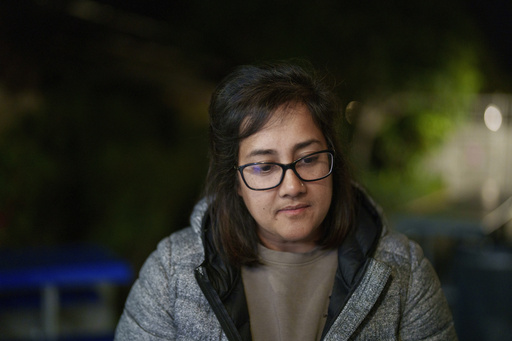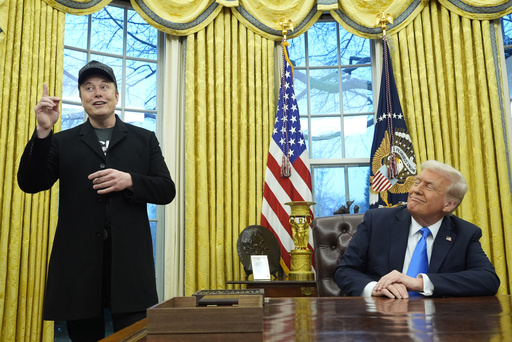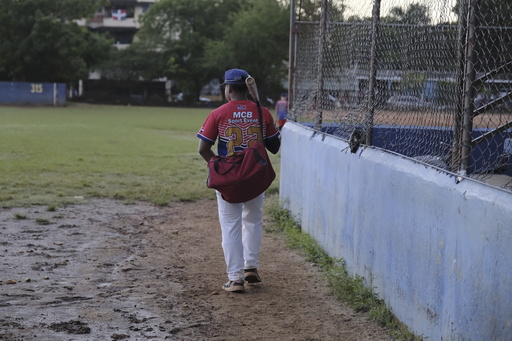PASADENA, California — The remnants of Masjid Al-Taqwa are now limited to a sign that displays its name.
This mosque, nestled in Altadena and a cornerstone of the local Muslim community for over four decades, was tragically destroyed in one of the deadliest fires in the Los Angeles area last January. The community is left devastated, especially with Ramadan approaching, as they find themselves without a space to gather for prayer or to break their fast together.
In a recent gathering, around 20 mosque members, along with several related families, congregated at a nearby Islamic school to pray and share a meal for the first time since the devastating fire. Many participants are currently residing in motels or with friends and family due to the loss of their homes in the Eaton fire, which claimed 17 lives and damaged thousands of residences, burning over 14,000 acres across Los Angeles County.
With the holy month of Ramadan just around the corner, volunteer imam Junaid Aasi brought some hopeful news. Dressed in a white robe and prayer cap, Aasi set up a small karaoke machine on the plush blue prayer rugs in the multipurpose room of the New Horizon Islamic School.
He shared with the congregation that the school would generously provide its space for them for four nights each week throughout Ramadan. His announcement was met with a chorus of relief and gratitude, with many exclaiming “Alhamdulillah,” which translates to “praise be to God.”
Aasi acknowledged the community’s anxiety regarding Ramadan and expressed gratitude for the offered space, emphasizing its importance during this challenging time. “During Ramadan, we pray, break fast, and support each other and those in the broader community,” he noted. “Given how much people have lost this year, it feels even more crucial.”
The imam, who also works as an IT professional, has volunteered at the mosque for 25 years and has revisited the site since the fire. At times, the memories of the mosque are vivid, with its areas for wudu—the ritual washing before prayer—and the large prayer carpets flashing before his eyes.
“I often close my eyes and remember it all as it was,” Aasi shared somberly. “It’s hard to accept that it’s all gone.”
The emotional toll remains significant, with many congregants still feeling displaced and grieving their losses. Aasi relayed a message from one member who, overwhelmed by the sight of their burned-down home, chose not to attend the gathering.
Aaron Abdus-Shakoor, a founder and current board president of the mosque, faced personal losses as well, including his home and the premises that housed his real estate business. He reflected on the mosque’s journey from its roots in the 1970s as a meeting point for Nation of Islam members to a vibrant multicultural community, eventually renamed Masjid Al-Taqwa in 1997, which translates to “pious and god-conscious.”
“All these years, we’ve strived to be exemplary citizens and a positive influence in our neighborhood,” Abdus-Shakoor remarked. The community’s Ramadan celebrations have greatly expanded, transitioning from simply marking the end of Ramadan with Eid al-Fitr to including daily communal iftar meals breaking the fast throughout the month.
For many, the mosque has represented a second home. Salah Eddine Benatia, an Algerian immigrant who arrived just three months ago, expressed how warmly he was welcomed by the community, stating, “Being here makes me feel part of a family, especially during Ramadan.”
Farzana Asaduzzaman, a resident since 2016, fondly recalled past Ramadans filled with community gatherings, food, and fun activities for children. She mentioned that while they lost their home in the fire after investing two and a half years in renovations, they would remain united. “Although our masjid and neighborhood are gone, our community is resilient and strong,” Asaduzzaman asserted. “We’ll come together for Ramadan, no matter where we are.”
For Mohammed AlDajani, a second-year medical student, the mosque served as a vital space just a short walk from his condo, which was also lost in the flames. For him, who had no close friends or family in the area, the mosque fulfilled his social and spiritual needs.
“The masjid was a huge reason I chose to live here,” AlDajani explained. The diverse composition of the community, consisting of many nationalities, including Arab, African American, Afghan, Indian, and Bangladeshi, made it especially welcoming to him.
Reflecting on last year’s Ramadan, he reminisced about a community project that involved painting a mural of Al-Aqsa Mosque, which resonated deeply with him, especially during turbulent times for his people. Learning of the mosque’s destruction before discovering his own home was gone left him heartbroken. “I felt a profound loss. It was my sanctuary, a vital part of my days,” AlDajani expressed.
In the face of difficulties, AlDajani appreciates the support of the mosque community. “Our prayer group still meets during weekends. Even with the uncertainties, it’s comforting to know we can still gather and pray together.”
Sakeenah Ali’s children, who attended a school nearby, experienced the loss as well, hearing the call to prayer from their classes before the fire. Ali vividly remembers the terrifying moments she witnessed while the mosque burned, with chaos enveloping the scene around her.
Nevertheless, she views her community as resilient and emphasizes the importance of maintaining their connections. “It’s crucial to stay engaged,” she stated. “Consistency in prayer and presence will help us rebuild together.”






